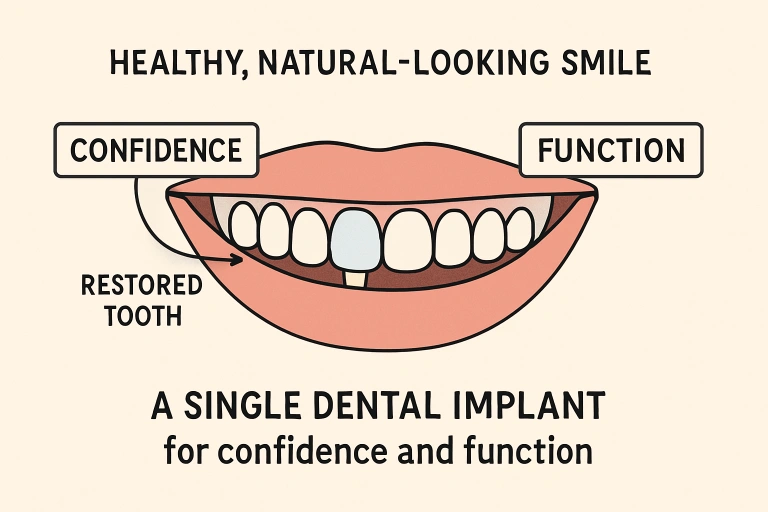
Missing a tooth isn’t just about aesthetics—it can affect your eating habits, speech, and the confidence you bring to face each day. Addressing this gap in your smile is crucial, and a single dental implant In Newton, MA, offers a reliable, lasting solution. Throughout this resource, you’ll learn how single dental implants work, their notable benefits, and why they are considered the gold standard in tooth replacement.
Single dental implants have transformed restorative dentistry, creating remarkable improvements in both oral health and psychological well-being. Implants not only replicate the look and feel of a natural tooth but also restore the strength and functionality needed for everyday eating and speaking. The process may seem intimidating at first, but understanding what’s involved can help ease any apprehensions and empower you to make a confident, informed decision.
Table of Contents
What Are Single Dental Implants?
Single dental implants are titanium posts surgically placed into the jawbone, acting as a replacement for the missing tooth’s root. Once inserted, the implant integrates with your natural bone through a process called osseointegration. This creates a foundation strong enough to support a custom-made crown, which is designed to blend seamlessly with the rest of your teeth. Experts note that the popularity of dental implants has been rising steadily in recent years, as highlighted by CBS News, due to their durability and long-term benefits. The result is a natural-looking, fully functional tooth replacement that can last for decades with the proper care. With proper oral hygiene and regular dental check-ups, implants can maintain their function for a lifetime. Additionally, they help preserve jawbone density, preventing the facial changes often associated with tooth loss.
Benefits of Single Dental Implants
- Natural Appearance: Crowns are carefully crafted to match the shade, size, and shape of your natural teeth, ensuring a seamless and flawless finish.
- Enhanced Function: Implants allow you to chew, bite, and speak confidently—just as you would with your original tooth.
- Bone Preservation: Unlike bridges or removable dentures, implants stimulate and maintain jawbone density, preventing bone loss and facial sagging.
- Durability: With a high success rate and resistance to decay, implants can last a lifetime when properly maintained.
The Implant Procedure
- Consultation and Planning: Following a thorough dental examination and imaging, your provider will develop a personalized treatment plan tailored to your specific needs.
- Surgical Placement: The titanium post is surgically inserted into the jawbone under local anesthesia. This minimally invasive procedure typically takes approximately one hour.
- Healing Period (Osseointegration): Over the next 3-6 months, the implant bonds with the bone, forming a strong anchor for your new tooth.
- Abutment Placement: After healing, an abutment is attached to the implant, serving as a connector between the post and the crown.
- Crown Attachment: A custom-designed crown is attached to the abutment, completing the process and restoring your smile.
This staged process gives your bone and gums time to adjust and heal, increasing the long-term success rate of the procedure. For more on dental implant techniques and healing timelines, reputable sources such as the Mayo Clinic offer detailed guides. With proper care and regular dental check-ups, implants can last for many years, often decades. Maintaining good oral hygiene throughout the process helps ensure both the health of your gums and the stability of the implant.
Candidacy for Single Dental Implants
Ideal candidates for single dental implants are adults with healthy gums and sufficient jawbone to support the implant. Any untreated gum disease, persistent oral infections, or chronic conditions, such as diabetes, may complicate the healing process. Heavy smokers or those undergoing radiation therapy in the jaw area may also face challenges. However, advances in implant techniques mean that even those with mild bone loss may still be eligible for bone grafts or other preparatory procedures to improve candidacy.
Aftercare and Maintenance
To ensure lasting success, implants require the same diligent care as natural teeth. Brush twice a day, floss daily, and schedule routine dental check-ups. Pay extra attention to cleaning around the implant site to prevent plaque buildup and gum disease. Avoid biting complex objects or using your teeth as tools.
Potential Risks and Considerations
Dental implants are a safe and predictable solution for most people; however, as with any surgical procedure, there are risk factors to consider. These can include infection at the implant site, nerve damage, sinus problems (for upper jaw implants), or implant failure if the post does not integrate with the bone. Selecting an experienced, board-certified dentist or oral surgeon is essential for minimizing risks and achieving a lasting, functional result.
Cost and Insurance Coverage
The cost of a single dental implant can range significantly based on the complexity of your case, geographic location, and the materials used. On average, implants are a more significant investment than other options, such as bridges or dentures, but their durability often makes them more cost-effective in the long run. Some dental insurance plans may partially cover the cost, especially if the tooth loss was due to an accident or injury; however, specifics vary from plan to plan. It’s important to review your policy and discuss options with your dental office before starting treatment.
Also Read: Best Practices for Monitoring and Controlling Line-of-Credit Spending
Conclusion
Single dental implants restore both aesthetics and function, making them an exceptional solution for those seeking a permanent replacement for a missing tooth. With proper care, they can preserve bone health, boost confidence, and provide a natural-looking smile for years to come. If you’re considering a dental implant, schedule a consultation with a skilled implant specialist to determine the best approach for your unique needs and smile.